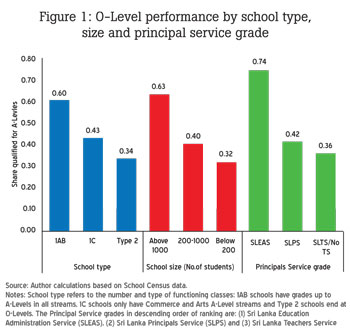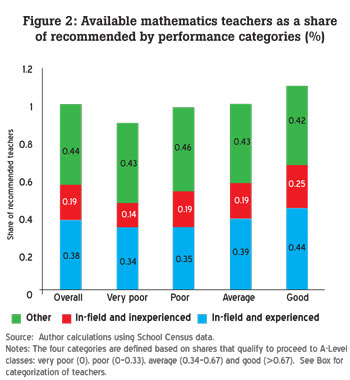18 Jul 2017 - {{hitsCtrl.values.hits}}
BY Ashani Abayasekara and Nisha Arunatilake
The G.C.E. Ordinary Level (O-Level) exam is a watershed in education for the youth in Sri Lanka. Success at the O-Levels opens avenues for further education and better skills but this is a full stop in education for many due to poor performance. Education and skills are essential ingredients to any strategy that aims to empower the youth, a key goal embodied in the World Youth Skills Day commemorated on July 15.
This March, as usual, when the O-Level results were released, articles spotlighting the island’s top performers and their schools abounded in the media. But what factors really contribute to good performance at exams? Is it mainly the ability of individual students or is it the influence of schools and teachers? In the meantime, low scorers at O-Levels received hardly any attention.
According to the Ministry of Education (MOE), in 2015, close to half the students (45 percent) either failed or only conditionally passed O-Levels due to failing mathematics. Who are these students and which schools are they from? Why are they unable to keep up with their more successful peers? What are the most effective ways to improve the pass rates? These are important questions to ponder, especially when trying to maximize the efficiency of government educational budget allocations.
To shed light on some of these issues, this article examines whether and to what extent the school-level resources have an impact on the O-Level performance. It focuses on several socio-economic, school, teacher and principal characteristics. These included the share of grade six students who gained admission to a school via the grade five scholarship exam – as an indicator of student ability – criteria measuring a school’s ranking, funds generated at school-level and several variables capturing the teachers’ and principals’ qualifications and experience (Box).
The O-Level performance was measured as the share of students who sit for O-Levels that qualify to continue to the Advanced Level (A-Level) classes. Three econometric models were estimated using data from the 2016 school census of government schools conducted by the MOE.
Modest – yet significant – school-level impacts
Many school-level factors have a significant impact on the O-Level performance although these effects are not of a large magnitude. Schools that have higher shares of grade six scholarship holders, community funds and qualified and experienced teachers for mathematics and first language – the two subjects for which at least a simple pass is compulsory at O-Levels – report better average results.
Teacher leave, on the other hand, lowers the O-Level results considerably. A school’s ranking based on type, size and principal’s service grade also affects performance, with poorer average O-Level results being observed for inferior/smaller schools and those managed by principals of lower rankings (Figure 1).
Policy suggestions
Pay special attention to improving performance standards in smaller, 1C (schools that offer only commerce and arts streams for A-Levels) and Type 2 schools (secondary schools that end at O-Levels). The finding that the O-Level performance is lower for both smaller schools and 1C and Type 2 schools holds, even after controlling for the share of scholarship holders, indicating that lower performance is not only due to differences in ability. These schools thus require special attention if the overall O-Level performance is to be increased nationally.
Develop policies to ensure that schools attract and cultivate in-field and experienced teachers (Box). As Figure 2 shows, schools that report the best O-Level results (good performers) have more than adequate numbers of mathematics teachers (a share of over one), a majority (44 percent) of whom are both in-field and experienced. In contrast, very poor-performing schools have a shortage of mathematics teachers and a large share of unqualified teachers. The share of in-field but inexperienced mathematics teachers – representative of recent qualified graduates with low experience – is also relatively high, even among better – is also relatively high, even among better-performing schools. Measures are therefore needed to reduce the numbers of unqualified and in-field inexperienced teachers, while at the same time increasing the shares of in-field and experienced teachers. Given that a teacher gains sufficient experience within a three to five-year period under Sri Lanka’s teacher recruitment structure, the target should be to expand the share of qualified and experienced teachers to at least 80 percent, from the current 40 percent. Meeting this target will depend on systematic training and recruitment of teachers into Teachers Service. 
Put in place incentive schemes for teachers to reduce leave of absence and take measures to provide substitute teachers in the absence of regular teachers. The findings show that the student achievement is low in schools when the number of days of leave taken by teachers is high. The average share of teacher leave days of total working school days stands at 15 percent, which is a significant figure.
Enhance the quality of principals’ training programmes and ensure that recruitment to Principals Service is carried out in a systematic and merit-based manner. The results suggest that the schools managed by better qualified and experienced principals perform better at the O-Levels. It is disturbing to note that, on average, 27 percent of schools in the sample are managed by principals belonging to low ranking grades – a figure which increases to 46 percent in very poor-performing schools.
Developing schools and improving the O-Level performance based on the above recommendations should be a priority, to give Sri Lanka’s youth better access to training for better skills.
The average share of teacher leave days of total working school days stands at 15 percent, which is a significant figure
(Nisha Arunatilake is a Research Fellow and Ashani Abayasekara is a Research Officer at the Institute of Policy Studies of Sri Lanka (IPS). This blog draws on an ongoing study on ‘School-Level Bottlenecks in Improving O-Level Performance Rates in Sri Lanka’ carried out by the writers. To view this article online and to share your comments, visit the IPS Blog ‘Talking Economics’ - http://www.ips.lk/talkingeconomics/)
Categorization of teachers
Recommended teachers: The number of required secondary-level teachers for each subject based on class sizes, determined by the MOE as stated in circular No. 1 of 2016.
In-field teachers: Teachers with a degree in the given subject or those with special training to teach the subject – i.e., teachers with good subject knowledge in the subject they teach.
Experienced teachers: Teachers with a Class 2-Grade II or above in Sri Lanka’s Teacher Service. These teachers usually have at least three years of experience in addition to pedagogical training.
Other-teachers: Teachers, either experienced or inexperienced, who do not teach a subject of their expertise (i.e., teachers who teach a given subject most of the time but are not qualified or trained to teach that subject).
09 Jan 2025 2 hours ago
09 Jan 2025 4 hours ago
09 Jan 2025 6 hours ago
09 Jan 2025 7 hours ago
09 Jan 2025 7 hours ago